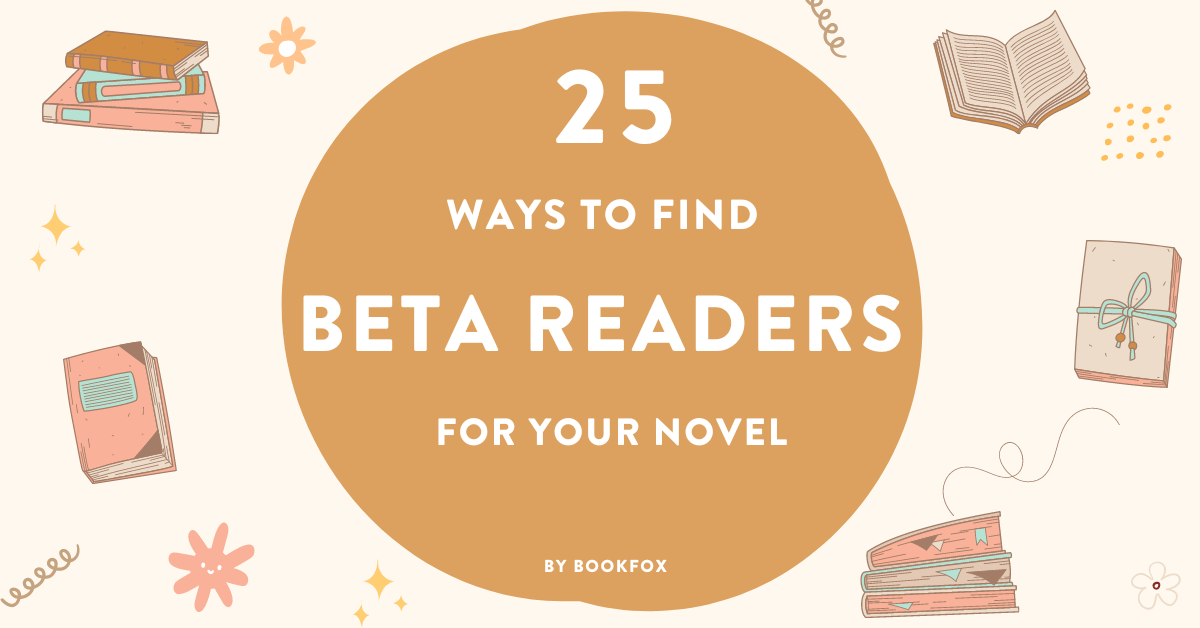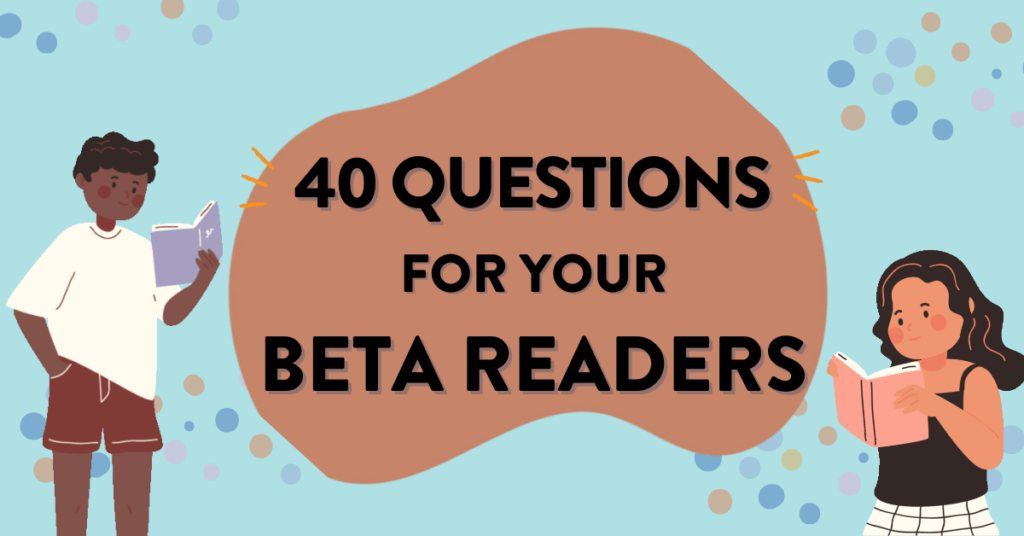
It’s incredibly difficult to find beta readers.
It’s almost easier to find an editor, because the relationship is transactional. Money = reading + advice.
But with a beta reader, you’re asking someone to commit 5 – 10 hours of their life to your brain and story. For free.
That’s a huge commitment, and you have to convince them it’s worthwhile.
What are Beta readers?
It is someone who reads a draft of your book and gives feedback for free.
They read it after you revise the first draft, and they read it before you go to a professional editor.
There are no special qualifications to be a beta reader, other than willingness to make it through your whole book and willing to give feedback on what they liked and disliked.
Approaching Beta Readers
First of all, here’s how you set yourself up for success before you give your manuscript to a Beta reader.
1. Don’t use a first draft.
Don’t inflict your first draft upon anyone. You should have combed over it several times, revising chapters and deleting sections. I would also recommend reading the whole draft out loud before you let anyone see it.
2. Pitch your novel well.
You have to convince readers that they will enjoy your book. Reading a great book takes an enormous amount of time; reading a terrible book takes quadruple the time (or at least it feels that way).
Come up with a pitch for your beta readers that convinces them this book will be exciting. Don’t say: oh, it’s probably not very good. Don’t say: you probably won’t like it.
- Don’t say: This is a book about two women who don’t like each other much.
- Do say: In 1940’s England, a codebreaker struggles to decode a German cipher that could lead to them winning WWII.
Tell them the storyline in a way that gets them begging to read your book.
3. Give them an excerpt
When you’re trying to convince someone to be your beta reader, let them see the first couple pages of your book.
This reassures them they won’t be slogging through a terribly written and uninteresting book. It creates a tiny bit of intrique and coaxes them into the story.
4. Ask whether they want a digital or hard copy
I know, I know — digital copy is SO much easier for you.
But is it easier for your beta reader? I know some beta readers who read 99% of their books on good old fashioned paper. That’s what they are used to.
For those readers, I end up printing out my manuscript and giving it to them or mailing it to them. And nominal cost of printing is offset by getting better feedback.
But probably 90% of your beta readers should be fine with digital copies.

Beta Reader Qualifications
1. Someone who enjoys your genre.
This is absolutely essential. You will usually get terrible advice if a reader who loves Romance is reading your Hard Sci-Fi.
Or a fantasy lover reading your literary fiction.
2. Gives criticism/praise.
You don’t want somebody who gives all praise (well, maybe it would help your ego). But to make your book better, you need some criticism.
On the other hand, you really don’t want somebody who offers ALL criticism. Your ego will struggle to recover.
The best choice is to look for readers who commit to a balance of criticism and praise. In fact, I would recommend asking for a balance of criticism and praise.
3. Honest
Virtually nobody is out to steal your manuscript. I find people who want me to sign a non-disclosure form are a little paranoid, kind of like believing that the government has implanted machines inside our eyeballs.
You will have a digital record of giving them the manuscript, and at least according to U.S. law, that gives you the copyright protection you need to sue anyone who appropriates your work.
4. Reliable
You want somebody who will actually get back to you with feedback, not a flake that will disappear.
5. Writers and Non-Writers
You don’t want only writers reading your manuscript. And you don’t only want non-writers reading your manuscript.
You want a mix of both. I guarantee you will get vastly different types of feedback and both are very helpful when revising your story.
6. Friends and Strangers
It’s a bad idea to only have your friends read your book. You really need feedback from both friends and strangers.
Friends tend to softpedal things, because they don’t want to jeopardize their friendship with you, but they also tend to be more reliable and trustworthy.
Strangers can be blunt and exceedingly honest, but they can also be flaky or just not the right reader for you. So there are benefits and downsides to both.
I don’t give my books to family, but maybe you have an exceptional sibling and it’ll work out for you (just be cautious).
7. Reads Non-Idiosyncratically
I know this seems like a weird one. But some readers don’t read like anyone else. They project their own weird opinions and backstory onto your novel.
Advice from these people is largely useless, because you’re not writing to an audience of one. You want to write to a large audience.
And so you want your beta readers to read generously, to serve as a sounding board for a whole group of people, rather than only themselves.

How to Find Beta Readers
1. Critique Circle
I’d strongly recommend Critique Circle. Tens of thousands of excellent beta readers there, and committed ones, too.
If you only pick one place to get beta readers, this would be my first choice.
Betareader.io has a free version and a paid version.
The free version allows you 1 book and 3 beta readers, which should be enough for a lot of writers.
The paid version is currently $9.99 a month, and gives you unlimited books and unlimited beta readers. They also have a Facebook group called “Beta Reader Connect.”
3. HeyBeta
HeyBeta is another paid version, but for $70 a year, or $7 a month, you get up to 25 readers per book.
I like the security of it — the reader never gets to download your book, so it stays safe and unpirated.
But it’s less of a place to find beta readers, and more of a platform that allows you to make sharing your book easier and more secure.
4. Reddit
Reddit has a community page dedicated to finding and providing beta readers for authors.
Post in that group if you need a beta reader or if you’re looking for one.
5. Absolute Write
Absolute Write is an old-school forum and they have sections dedicated to trading beta readers.
Although the website format is very old school and rudimentary, there’s still a good amount of interaction and visitors.
Every April and July, NaNoWriMo offers a virtual camp. You get paired up with other writers in “cabins” (based on genre and experience) and you all work on your individual projects together.
But if you do one, it’s one of the BEST ways to develop relationships with writers who will be overjoyed to read your work.
On the discord servers, The Writing Hub is a fantastic place to meet other writers and ask them to beta read your novel.
Tens of thousands of writers, all in a community — this is one of the best options writers have to connect with others online.
8. Scribophile
Scribophile offers writing groups and critique groups, and you will have no problem finding beta readers if you join.
It’s one of the older writing communities online, and they even have a special page dedicated to helping writers get beta readers.
9. Critters
File this under oldy but goody. Critters brags it’s served up over 300,000 critiques. I’m not going to try to face check that number, but I also wouldn’t bet against it being true.
If you write Fantasy, Science Fiction, or Horror, you will find the perfect beta readers for your manuscript here.
I’m not sure why so many of these message boards haven’t had a website redesign in 20 years, but if they connect you to other writers, then I guess it’s worth it.
Check out My Writer’s Circle to find other writers willing to read your manuscript for free.
11. Your Beta Reader
At some point there starts to be a gray space between a writing coaching/editor and a beta reader. I think Your Beta Reader might cross this line, but still, check it out. It’s a paid service.
12. Betabooks
This is another platform that manages your manuscript for you, but it’s not exactly a place that will give you hordes of people who are willing to read your story.
It’s more like HeyBeta than any of the communities I list here.
13. Critique Match
This is a service that pairs you up with another writer. It’s free and there is no subscription.
With 60,000 critiques exchanged, it’s one of the larger sites online to find a great beta reader.
If Critique circle didn’t work out for you, then this would be my second top choice to find good readers of your book.
14. CP Matchmaking
This is another matchmaking site that pairs up writers. It’s good for long term relationships, which might be too slow if you’re looking for a quick and dirty beta read.
15. Absolute Write
This website got so much traffic and requests looking for beta readers, they needed to slow it down. So you have to be a member of the community and posted at least 50 comments before you ask for beta readers
16. Beta Reading Group (Facebook)
Look for groups with the title “Beta Readers” on Facebook. There are many options, and most of them exist to help you find other Beta readers and exchange manuscripts.
But you are trading your time for feedback: you usually have to read their manuscript at the same time (but not always).
There are two giant groups with more than 4,000 members apiece, and then a smattering of smaller groups that focus on more than just beta reading (but might still be useful).
Also, I’m part of several general writing groups on Facebook, and whenever someone asks for a beta reader for their novel, at least two or three people volunteer to read it.
17. “Beta Reader Group” (Goodreads)
Go to “Groups” and then search “Beta Readers” in the search bar.
The main one, “Beta Reader Group” has 23,000 members. And then there are smaller beta reading groups for specific genres.
18. Local Beta Readers
If you join a local writing group at your library or check for local Meetups, you will be able to get feedback in person.
Usually, these writing groups work like exchanges: they read yours, you read theirs.
19. Beta Reading Services
The most obvious paid service is Beta Reading Services. The standard fee is $100 USD and they include a standard questionnaire that the beta readers will answer.
But if you have a controversial book, don’t go with them. They say they don’t have any qualms about rejecting for religious, moral, or political reasons.
Upwork and Freelancer.com also offer readers who moonlight as beta readers, and you can read feedback from their previous clients.
20. Twitter
If you’re on Twitter, you know there’s a robust beta reading community there. I would recommend looking for this hashtag:
21. Instagram
Look for any and all hashtags associated with #betareaders. Such as #betareaderlove
22. Previous Readers
If this isn’t your first book, it’s a fantastic idea to ask a fan to read the next book in the series.
They will be overjoyed that they get early access, and you’ll get awesome feedback from an ideal reader.
23. Conferences
A surprising number of writers tell me that they found their best beta readers at conferences. A conference lets you meet in person, gain some trust, and there’s at least some element of talent if you’re both attending the same conferences.
Conferences such as AWP, and gatherings of SCBWI are excellent places to find fellow writing souls who will be willing to read your material.
24. Friends
You can always ask people you know to read your book and give feedback.
But usually 2 – 3 friends is enough. Don’t try to get 10 people to read your book — you’ll get too much feedback, a lot of it contradictory.
25. Family
I really don’t recommend this option.

How to work with Beta readers
1. Offer a Beta Read Exchange
One of the best ways to ensure a good reading is to exchange manuscripts. You read theirs, they read yours.
Obviously this works best with other writers.
2. Ask them questions before they start reading.
Not too many questions! And sometimes ask different questions of different readers.
Maybe type up 3 – 5 questions that they might want to keep in mind while reading, and that they can give feedback on. The more experienced the beta reader, the less chance there is they will need questions. But if someone is beta reading for the first time, questions are ESSENTIAL.
Pick some from my list of questions for Beta Readers.
3. Let them have a “clean read”
Don’t tell them too much about the book! Only enough to pique their interest.
You want them to have a “clean read,” which means coming to the story without too many preconceptions. That way they’ll experience the book the way normal readers would, and they’ll give feedback on how that experience went.
If you prep them with info that normal readers wouldn’t have, they’re going to have a skewed reading experience.
3. Give them questions to answer after reading.
You can include more questions after reading because then they weren’t influenced by the questions themselves (they had a “clean read.”
Make sure to make some of these questions open ended. What did you dislike? Where did you get bored?
I would recommend compiling about 10 questions based on who your beta reader is. You can access a list of 40 questions by clicking that link in the last sentence.
4. Give Beta readers a time frame
Beta readers need a time frame to work in. Giving them your manuscript and saying, “Get back to me when you’re done!” is a recipe for never hearing from them again.
I would recommend asking them how long it will take them to read your book (and tell them the word count). This is always a better move than saying: I need feedback in two weeks, because they get to choose their own time frame.
Usually 1 month or six weeks is an excellent time frame. Not too long and not too short.
5. Tell them you’re not afraid of criticism
This is really key. So many beta readers don’t want to hurt your feelings. They feel like they’re being mean or cruel when they say they were bored during a chapter.
So tell them before they start that you WANT criticism. That it’s okay to
6. Check in with them
About 50% of the time through the time you both agreed on, send an email asking how it’s going.
Beta readers who haven’t started will be reminded that they need to get reading, while readers who have already started will be overjoyed to tell you that they’re in progress. Either way, it’s a win for you.
7. Tell them thank you
When you get the manuscript back, tell them thank you right away.
Also, tell them you’re going to read their feedback and think about it for a bit. This buys you time so they’re not biting their nails wondering if you absolutely hated what they said about your book.
8. Don’t Critique their Critque
Don’t tell them what they misunderstood. Don’t try to correct their reading.
Don’t tell them they read it badly. Don’t insult them. Don’t try to explain.
You should only ask for clarification if you genuinely didn’t understand something, or they didn’t comment on a huge part of your book.
9. Incorporating Feedback
After you get the feedback, let it settle in. Sometimes it takes a week or a few weeks for your imagination to adjust to the influx of ideas.
So don’t say anything back to them about how such-and-such was a terrible idea, or even that you love an idea. Let it percolate.
Remember that some beta readers will be useless: you will get almost ZERO good ideas from them. This is normal.
Usually, I get ONE great beta read per book. If you’re lucky, you might get two.
This is a reader who really gets my book and gives great feedback about the different pieces.
10. Send them a free book
It’s customary to send your beta readers a copy of the finished book as a thank you. Seriously, don’t forget this.
It shows you appreciate them and it’s just polite. You want to keep good relationships going with people in the writing industry, so don’t be a cad.
11. Don’t forget the Editor
Beta readers are not a substitute for editors. Beta readers are a warm up.
Beta readers kick your tires, help you to think about your book a little more, expose you to some reader responses.
A developmental editor will blow you away with accurate information — their narrative instincts are honed by decades of practice — and also by the sheer volume of information.
Beta readers give you a page of feedback. Developmental editors will give you 8 – 10 pages.
I can’t tell you how many times I’ve given feedback to a writer and they said they learned more from that single edit than taking 5 classes, getting 12 beta readers, and reading 20 books.

FAQ
1. Are sensitivity readers the same as Beta Readers?
No. Every sensitivity reader is a beta reader, but not all beta readers are sensitivity readers.
Sensitivity readers are designed to make sure you’re not embarrassing yourself when you write about other cultures and places. They are usually from the group you’re writing about, and can point out mistakes of phrasing or misrepresentations that will get you in hot water after publication.
Most books don’t need sensitivity readers, but all books need beta readers.
2. How many beta readers do you need?
I would recommend at least three.
If you only get one or two, it’s simply not enough feedback. But if you start getting more than seven, you’ll be overwhelmed with the feedback.
Also, it depends on the quality of the pool of beta readers. If you know you have solid ones that are very reliable and insightful, you might only need two or three.
If you’re trying most of them for the first time, then sure, get 5 – 7 to ensure you get some useful and helpful feedback.
3. What’s the difference between alpha and beta readers?
Alpha readers are your first readers — they read your work in progress. They read an evolving version of your book, and look to give you big picture feedback.
Beta readers read a book that’s very close to being your final product. You’ve already created the best book you can, and you’re looking for additional feedback before publishing it.
*
If you know any other places to find beta readers, please list them in the comments below!


3 comments
I’m looking for veterans of the Vietnam War who are beta readers.
Love this! Thank you for making time to provide a helpful resource for others <3
This is wonderful and helpful.
I have just one question. Are any of these sites you have mentioned a good place for beta readers of children’s books?